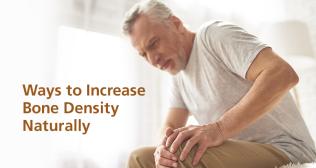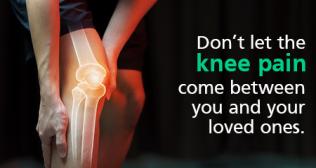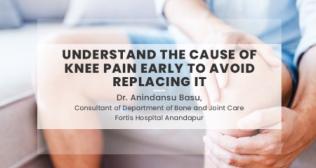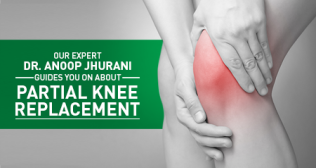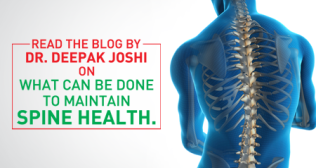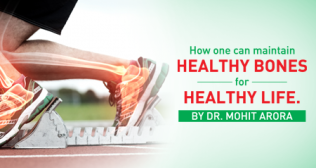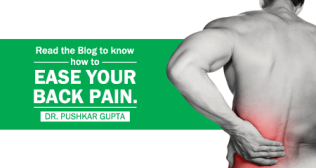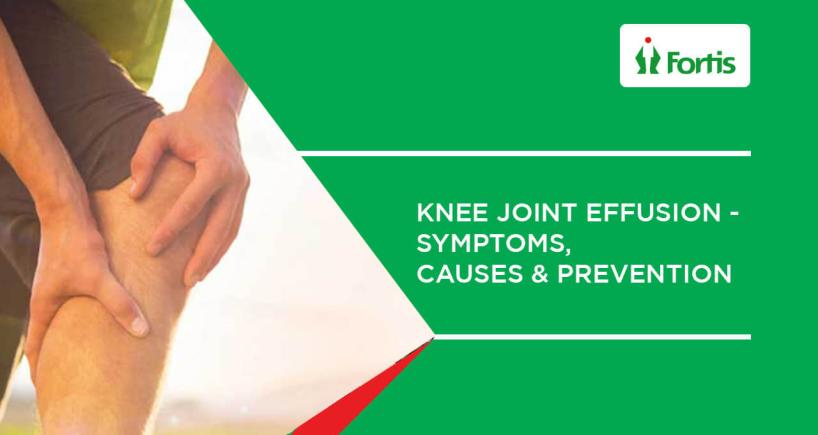
Knee Joint Effusion - Symptoms, Causes & Prevention
What is Knee Joint Effusion?
Water collection on the knee is medically known as knee effusion and is a condition in which there is an excess of fluid accumulation in and around the knee joint. Some of the most common causes of this condition include arthritis and injury to the ligaments present in the cartilage in the knee. The presence of fluid in acceptable amounts is a normal phenomenon in joints. However, in certain conditions such as rheumatoid arthritis excess fluid can build up thus making the knee puffy and swollen.
Knee Joint Effusion Symptoms
The build-up of excessive fluid in the joint areas results in puffiness around the bony parts of the knee. This can occur unilaterally and can cause difficulty while bending or straightening the knee joint.
The common water in knee symptoms include:
- Swelling or puffiness
- Stiffness in the joint
- Reduced motion in the knee
Certain symptoms require immediate medical attention. These include:
- Inability to stand or put weight on the joint
- Fever
- Loss of sensation and pulse below the knee
Knee infusion or fluid accumulation in the knee can be caused due to certain underlying conditions. These can cause discomfort and difficulty in performing daily functions.
Causes of Knee Effusion
Generally, arthritis, infection, or traumatic injuries can result in swelling and inflammation of the knee joint. This results in fluid build-up in the knee that can cause discomfort and disability in extreme cases. The type of fluid accumulation in the knee depends on the underlying condition or the type of traumatic injury.
What is the most common cause of knee effusion?
| 1 | Rheumatoid arthritis |
| 2 | Osteoarthritis |
| 3 | Traumatic injury |
| 4 | Septic arthritis |
| 5 | Gout |
| 6 | Pseudogout |
| 7 | Tuberculous arthritis |
| 8 | Juvenile rheumatoid arthritis |
| 9 | Wear and tear due to sports |
1. Rheumatoid arthritis
This is a condition in which several joints get affected as a result of pain and swelling. The affected joint usually feel hot to the touch with pain lasting for more than 30 minutes.
2. Osteoarthritis
This condition leads to pain and stiffness upon waking up in the morning but usually improves within an hour of getting up.
3. Traumatic injury
Traumatic injuries can result in bruising and severe pain in the joint that can lead to discomfort while walking and while putting weight on the knee joint.
4. Septic arthritis
This is a painful infection in the joint that is a result of germs that travel throughout the bloodstream originating from another part of the body.
5. Gout
This is a form of arthritis that results in extreme pain, inflammation, and tenderness in joints.
6. Pseudogout
This is a temporary episode of a painful type of arthritis that results in swelling in one or more of the joints. These episodes last for days or weeks in some cases.
7. Tuberculous arthritis
This type of arthritis is caused due to an infection of the joints due to the presence of tuberculosis.
8. Juvenile rheumatoid arthritis
This form of arthritis is the most common type affecting children and is characterized by inflammation in the joints that is short-term or can even last for a lifetime.
9. Wear and tear due to sports
Certain strenuous physical activities or sports can lead to the breakdown of the knee joint in extreme cases.
How can water on the knee be prevented?
There are certain precautions and lifestyle changes that can be made to prevent knee effusion. It is recommended to seek medical advice if there is any new or sudden swelling in the knee. Immediate medical attention is required if there is no sensation of pulse below the knee along with a fever.
- Avoid high-impact sports activities on a daily basis
- Avoid sudden jerking or jolting movement in the joints
- Maintain an optimum body weight
- Avoid repetitive movements
- Seek medical attention for existing arthritis
FAQ's
Is knee effusion serious?
Knee effusion, or the accumulation of excess fluid in the knee joint, can be a serious condition if it is left untreated or is caused by an underlying injury or disease. It can cause pain, swelling, and difficulty moving the knee joint. It is important to seek medical treatment to determine the cause and address any potential underlying issues.
Can knee effusion go away by itself?
It is possible for knee effusion (excess fluid in the joint) to resolve on its own, particularly if it is caused by minor inflammation or injury. However, if the underlying cause is not addressed, the effusion may persist or reoccur. Seeking medical treatment and following a prescribed treatment plan can help to reduce the risk of long-term issues with knee effusion.
What happens if knee effusion is left untreated?
If knee effusion (excess fluid in the knee joint) is left untreated, it can cause increased swelling and discomfort, difficulty moving the joint, and potentially lead to more serious issues such as joint damage or infection. It is important to seek medical treatment to properly diagnose and address the cause of the effusion.
Orthopedic Services at Fortis Hiranandani Hospital, Vashi, Navi Mumbai
Fortis Hiranandani Hospital Vashi is the best hospital for the treatment of orthopedic cases in the city. Our panel of orthopaedists and orthopedic surgeons are some of the most experienced and highly-trained medical specialists. Fortis Hospital Vashi is equipped with advanced medical equipment and is supported by our well-trained medical staff.
The hospital has been one of the highly-rated medical centers for treating and managing multispecialty disorders spanning all age groups. Fortis Hiranandani Hospital also specializes in the diagnosis and successful management of sports-related orthopedic disorders.
Quick Links
orthopedic hospital in Mumbai | orthopedic doctors in Mumbai | orthopedic doctors in Navi Mumbai
Categories
Clear allMeet the doctor

- Orthopaedics | Robotic and Computer navigated Joint reconstruction | Orthopaedics and Joint Replacement | Orthopaedics and Spine Surgery | Sports Medicine | Orthopaedics
-
18 Years
-
1500







